JICA’s Support for Foreign Human Resources: Benefits for Both Developing Countries and Japan
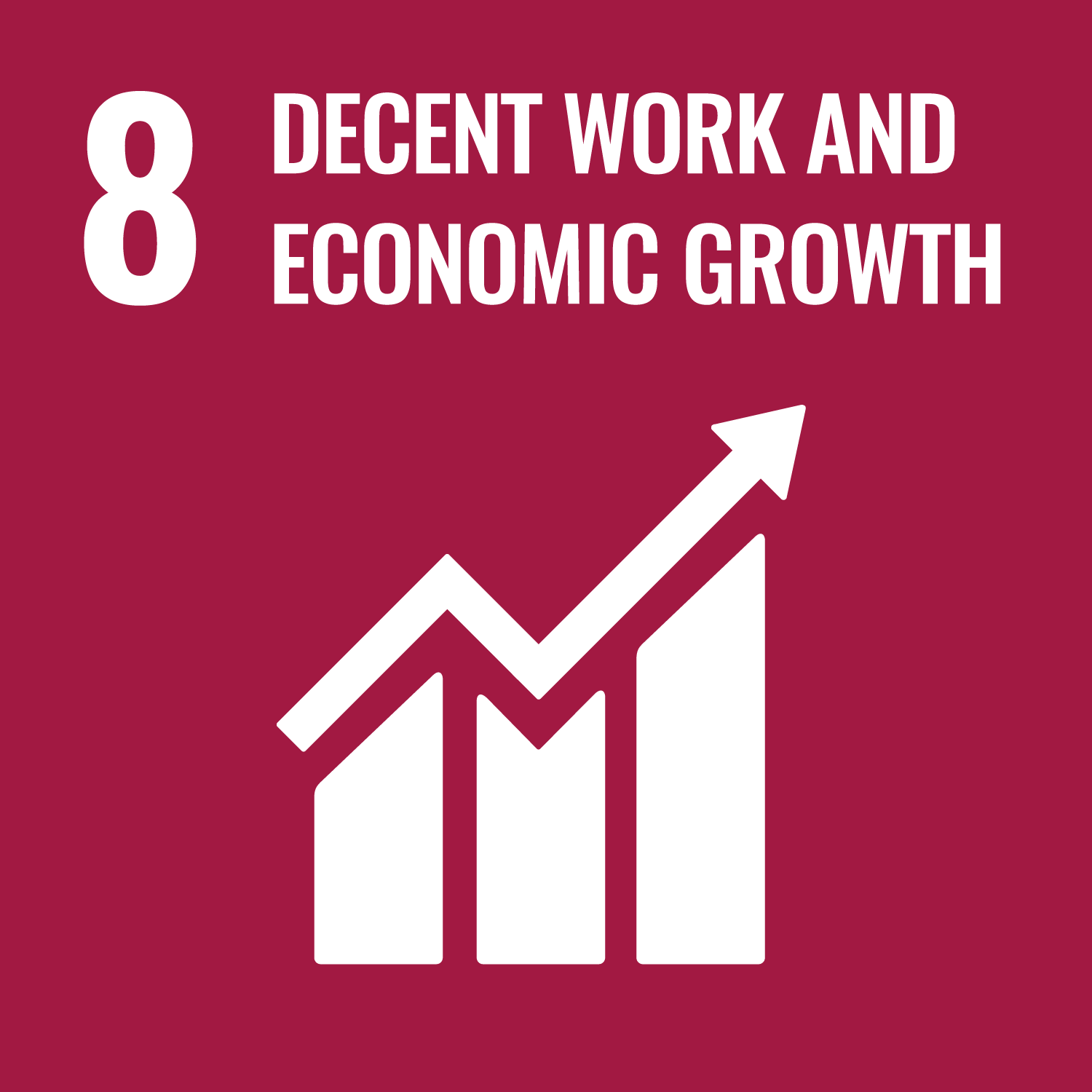
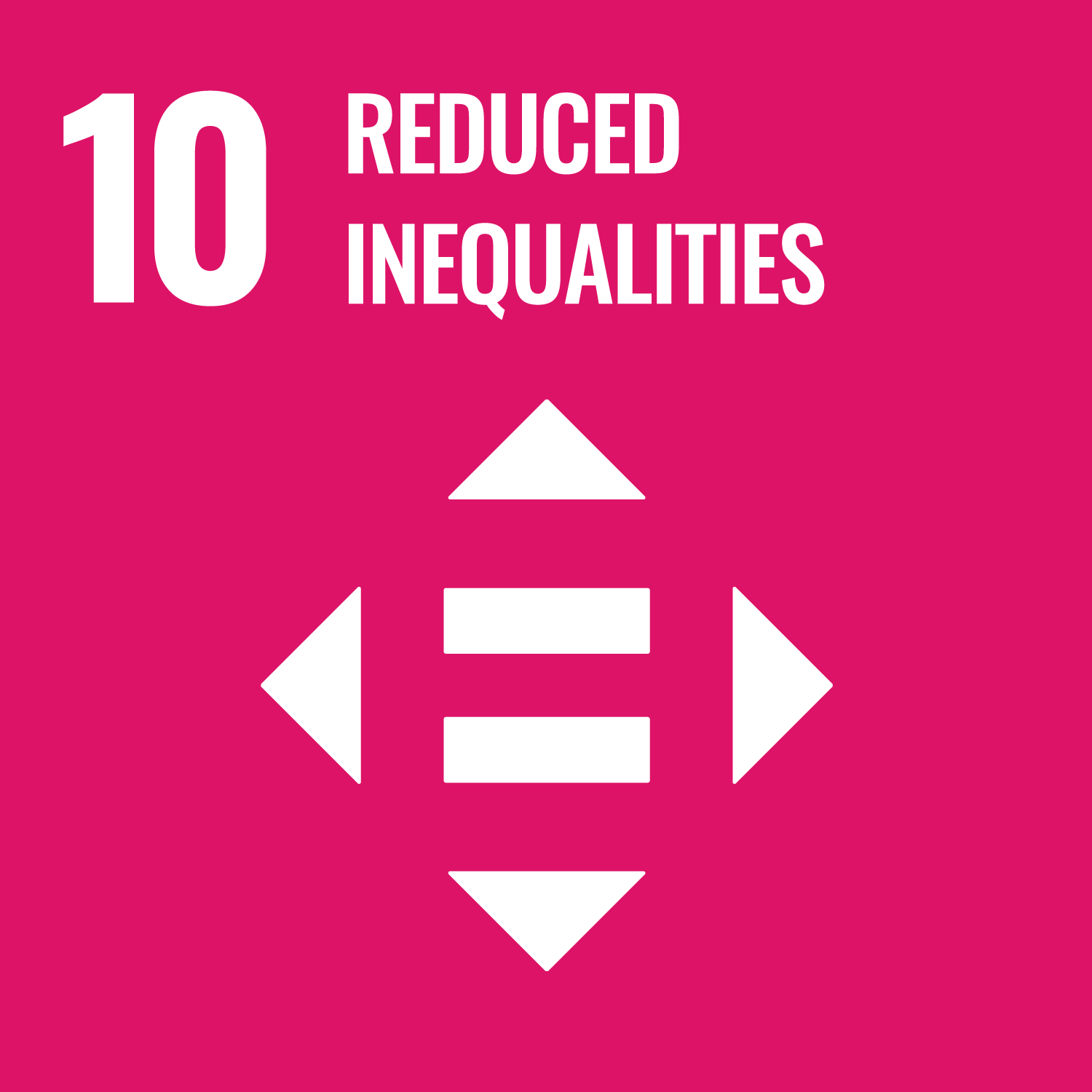
2023.11.13
In the face of population decline and aging, Japan needs to attract human resources from abroad to keep its society and economy strong. But unless steps are taken to improve working and living conditions, migrant workers might be tempted to pursue job opportunities elsewhere. Here, Kobayashi Yosuke, senior director of JICA’s newly established Office for Foreign Human Resources, identifies the key issues in attracting foreign human resources and describes the steps JICA is taking to overcome these issues.

Japan is facing a serious labor shortage. There are not enough workers to serve bus routes or operate hospitals. Women and older people are helping fill the gap, but Japan also needs more migrant workers to continue offering essential social services.
The number of workers from abroad has been gradually increasing since the 1990s, reaching a record high of 1.82 million in 2022. But this is not enough to make up for Japan’s declining birthrate and aging population. By 2030, demand for migrant workers is expected to rise to 4.19 million, but the supply potential will be just 3.56 million, resulting in a shortfall of 630,000 workers, according to an estimate by the JICA Ogata Sadako Research Institute for Peace and Development.
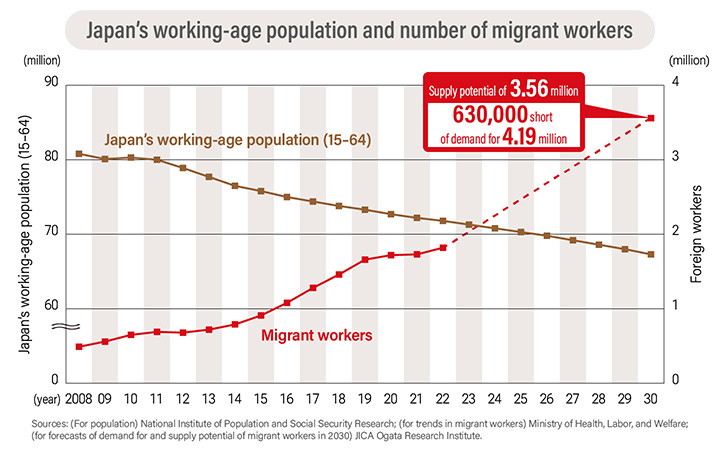
This suggests that unless more people choose Japan as their destination for migrant work, the dynamism of Japanese society will be difficult to maintain. But with other countries also facing population aging, competition for such workers has been rising. Can Japan secure the workers it needs by providing a safe, secure, and attractive destination for their services?
“Most migrant workers come from developing countries, and there have been many success stories. Unfortunately, there have also been cases, as reported in the media, of disputes involving these human resources over working conditions and violations of human rights,” says Kobayashi Yosuke, senior director of JICA’s Office for Foreign Human Resources. “As the value of the yen continues to decline, many more workers may choose not to come to Japan. That would be a big problem for us at JICA, since it could undermine the trust we have built up with many countries through development cooperation.”
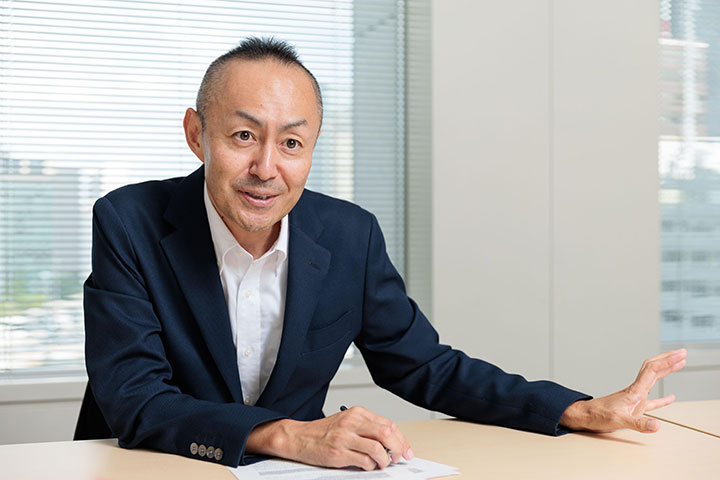
Senior Director Kobayashi Yosuke of the Office for Foreign Human Resources has long been engaged in governance issues, including “business and human rights,” as well as global health.
The source of most problems involving foreign human resources in Japan, Kobayashi feels, can be traced back to issues in their home countries.
Some migrants, for instance, go into heavy debt to pay off local brokers who arrange for their employment in Japan. This forces them to accept jobs or working conditions that fall short of their expectations, often without being able to protest. Others may not have been given enough information about available positions or working conditions and find that the skills they possess do not match those being sought. Many end up being isolated in their workplace or community because they had not received adequate language instruction or technical skills training. These are the problems that must be addressed starting in the home countries before workers arrive in Japan.
“Of course, there’s a need to raise awareness of workers’ human rights in Japan,” Kobayashi says. “But that’s not enough. Many problems arise when migrant workers are preparing to come to Japan. And that is an area where I believe JICA has a role to play.”
This was the setting in which JICA established in April 2021 the Office for Foreign Human Resources. JICA has many years of experience implementing development cooperation projects in areas like agriculture, industrial development, and legal and judicial development. And it has acquired extensive knowledge and built networks over the years. The new office is tasked with utilizing these resources to promote multicultural coexistence and support the acceptance of foreign human resources.
“JICA has built an extensive network of government officials, experts, and volunteers in developing countries,” Kobayashi adds. “This is thanks to years of cooperation in developing human resources and promoting policymaking and institutional improvements. JICA operates offices not only in Japan but also around the world. That’s a big advantage in enabling us to address issues faced by foreign human resources, both in their home countries and Japan.”
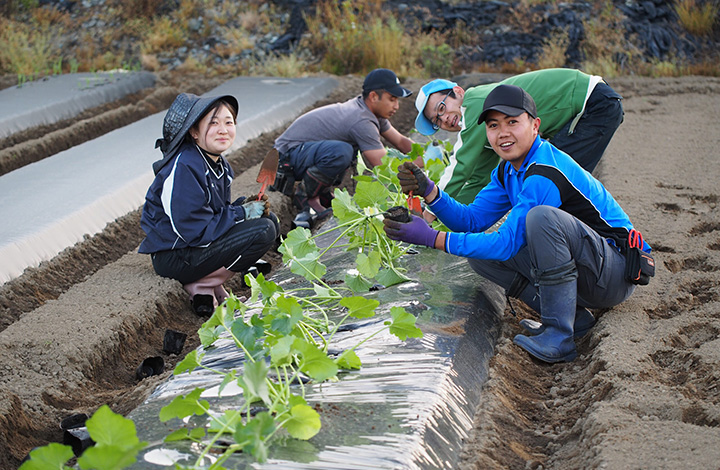
Former members of the Japan Overseas Cooperation Volunteers are important assets for JICA. Farm operator Taya Toru draws on his JOCV experience to facilitate the dispatch and acceptance of agricultural trainees from Indonesia and to support their career development after they return home.
The dispatch and acceptance of foreign human resources can be a plus for the workers themselves, their home countries, and the countries where they work, such as Japan. The workers themselves benefit by earning a higher income and acquiring new skills. The home countries gain from the remittances sent by the workers and the skills they bring home, potentially leading to new business opportunities with Japanese companies. And these workers can benefit Japanese society and economy by contributing to regional revitalization and easing labor shortages.
JICA’s main focus, Kobayashi says, should be on “contributing to the economic and social development of developing countries, while also seeking to turn such contributions into pluses for Japanese society and economy.”
In June 2023, the Office for Foreign Human Resources established new guiding principles that clarified the meaning of these initiatives for JICA and outlined how it would leverage its strengths to promote collaboration and value co-creation with diverse stakeholders. The three main pillars of JICA’s work on migration and development are (1) capacity development to enhance migration’s contribution to economic development, (2) promotion of respect for the human rights of migrant workers, and (3) creation of an inclusive society for foreign human resources in Japan.
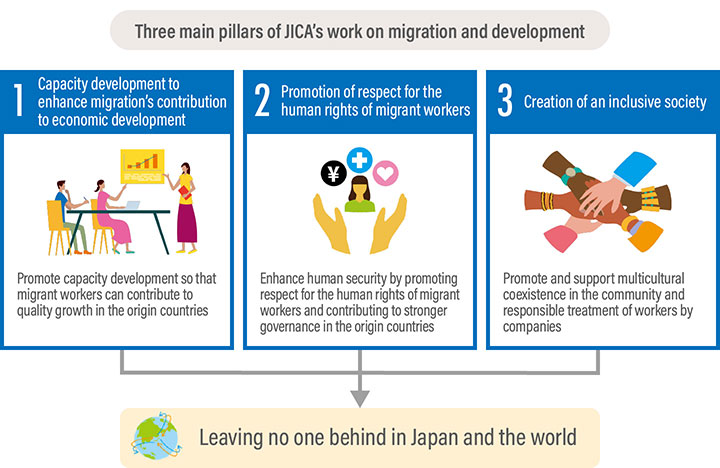
Below are examples of recent initiatives based on the new guiding principles.
Capacity development to enhance migration’s contribution to economic development (Indonesia)
With 270 million people, Indonesia has the world’s fourth largest population and is eager to send workers overseas. In September 2023, JICA dispatched an advisor to not only facilitate workers’ smooth transition to Japan but also to foster the human resources capable of contributing to Indonesia’s development once they return home. While still in Indonesia, workers are provided with information about work in Japan, as well as opportunities to learn the Japanese language and acquire needed skills. The goal is to dispatch 100,000 migrant workers to Japan over the next five years.
Promotion of respect for the human rights of migrant workers (Vietnam)
One in four migrant workers in Japan come from Vietnam, but many arrive without having been properly informed or gaining an understanding of traveling, working, and living in Japan. Some pay high fees to brokers to work in Japan. To address these problems, JICA launched a project in August 2023 to promote ethical and fair recruitment in Vietnam. In cooperation with Vietnamese labor authorities, a recruitment system is being established to eliminate high broker fees, exploitation, and mismatches by providing accurate information about jobs and encouraging workers to apply directly to recruitment agencies.
Creation of an inclusive society for foreigner human resources in Japan (conducting disaster prevention training for foreign residents)
JICA Kansai conducts disaster prevention training in cooperation with businesses employing foreign human resources, local governments, and international associations. To enhance disaster preparedness, foreign residents are shown how they can gather information in multiple languages in the event of a disaster and how to prepare and take measures to shelter in place. After several training sessions, they can become disaster prevention leaders in their respective communities. JICA aims to create a safe and secure environment for foreign residents in Japan and contribute to multicultural inclusion by building a system for disaster cooperation that includes foreign residents.
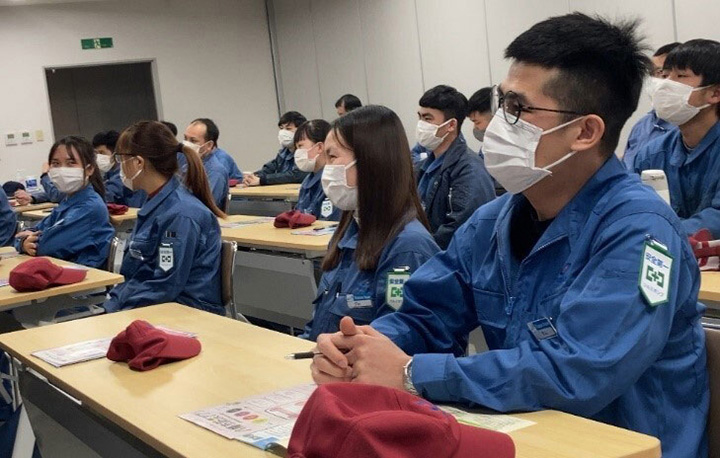
Disaster prevention training for Vietnamese workers in Japan in March 2022.
The presence of foreign human resources leads to diversity, which in turn can result in greater social vitality. But achieving such dynamism requires the cooperation of many different actors—governments, international organizations, businesses, local governments, schools, and local residents—to address issues in both origin and destination countries.
How can we build a more prosperous and inclusive society? In September 2023, JICA launched a new program for accepting donations from businesses and citizens to support efforts toward multicultural inclusion and acceptance of migrant workers. The program is aimed at raising interest in and support for initiatives relating to migrant workers and at encouraging dialogue about such issues.
“I hope these opportunities will prompt more people to become interested in these issues and in the efforts JICA is making with its partners toward their resolution,” Kobayashi noted. “And I hope, as a result, that both Japan and the world will move a step closer to fulfilling their commitment to ‘leave no one behind’ and to protect and strengthen human dignity, which is the basic principle underlying the SDGs.”
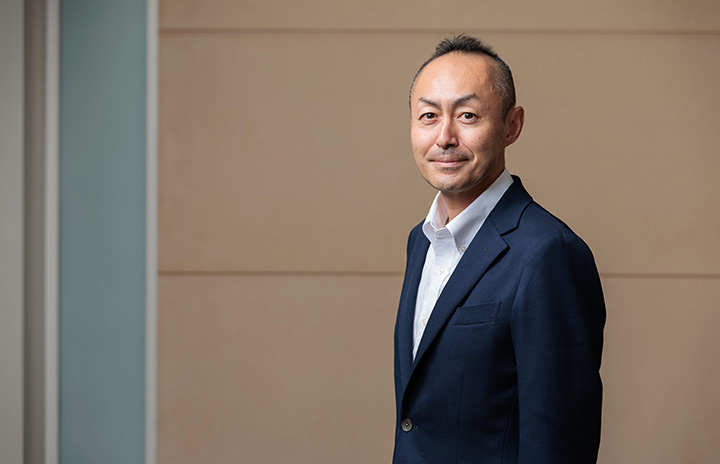
Kobayashi volunteers his time to help foreign-born children learn Japanese and helps out with their schoolwork. He himself is currently learning Vietnamese.
scroll